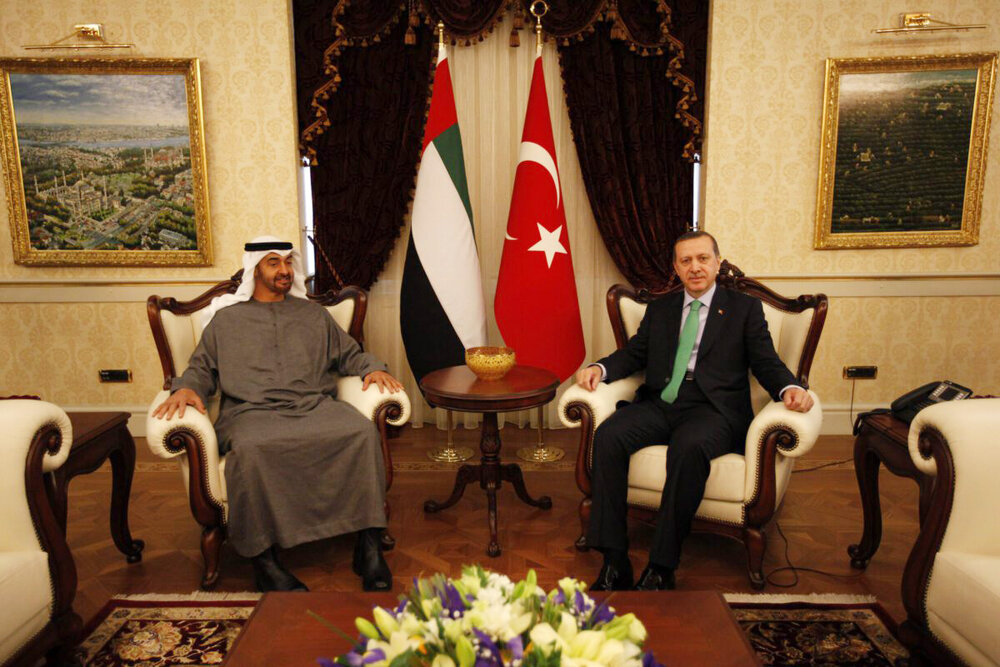MBZ in Ankara: deciphering Emirati mentality

TEHRAN – After years of frayed relations with several countries in the region, the United Arab Emirates is launching a new foreign policy drive aimed to repair the oil-rich country’s foreign relations at a time when regional powers begin to take on a new role on the regional chessboard.
But the refashioned Emirati foreign policy has remarkably missed out on Iran.
On Monday, as Turkish Foreign Minister Mevlut Cavusoglu arrived in Tehran for talks on a range of bilateral and regional issues, Western media broke the news that Abu Dhabi Crown Prince Sheikh Mohammed bin Zayed, the UAE's de facto ruler, will pay a rare visit to Turkey after a decade of bitter rivalry between Abu Dhabi and Ankara in the broader region.
Citing two Turkish officials, Reuters said the visit will include talks with Turkey's President Recep Tayyip Erdogan. It will be the highest-level meeting between the two countries since the breakout of what came to be known as the Arab Spring a decade ago when Turkey and the UAE supported opposing sides in many Arab countries such as Egypt, Libya, Sudan, and Tunisia.
The first sign of significant thaw in UAE-Turkey relations emerged in late August, when Erdogan received the Abu Dhabi crown prince’s right-hand man, Sheikh Tahnoun bin Zayed, in Ankara. Two weeks later, Erdogan and bin Zayed spoke over the phone.
It was then when the Turkish president joyfully announced that the UAE would make a significant investment in Turkey. Improvement of ties between the two countries came against a backdrop of wider de-escalation in the region. Saudi Arabia cooled tensions with Turkey, Qatar, and to some extent Iran; Turkey and Egypt held several rounds of talks to defuse tensions; Qatar and Egypt buried the hatchet; and finally, the UAE, together with Jordan and with the tacit support of Saudi Arabia, took a major step in bringing Syria to the so-called Arab fold.
But this broader inclination to put aside differences would fail to explain the whys and wherefores of the new Emirati push if not seen within the bigger picture of the newly-recalibrated Emirati foreign policy.
The tiny Persian Gulf nation has undertaken a quiet, yet strategic, reassessment of its foreign policy in light of the changing dynamics of the region. The first result of the assessment is the redefinition of the UAE’s position in the Arab world and of the interests of the UAE and Arabs in general and the perceived threats to these interests.
In Emirati strategic thinking, the Arab world is not immune to infiltration by regional powers that could use certain ideologies to gain a foothold in some Arab states. Therefore, the UAE should block all the pathways for such an infiltration.
After years of unrelenting efforts, the UAE feels that it has clinched a victory over Turkey in many Arab states where the two rivals have been involved in geopolitical competition. The Turkish-aligned Muslim Brotherhood, the UAE’s sworn enemy, has been marginalized or toppled in Sudan, Egypt, Tunisia, and Libya. And that happened with the direct involvement of the UAE.
As a result, Turkey turned into less imminent danger. The economic woes facing Turkey have only fortified this feeling in the UAE, prompting the Emiratis to offer Erdogan a helping hand economically and strengthening their influence in Ankara in preparation for the post-Erdogan era.
Thus, now it’s time to counter more urgent threats coming from other regional players. The most urgent threat, according to Emirati thinking, comes from Iran. Many media outlets and academics closely affiliated with the UAE have, directly or indirectly, pointed to this assessment. The most recent example was the UAE foreign minister’s visit to Syria, which was portrayed as an effort to undermine Iran’s influence there. The UAE’s normalization of ties with Israel, the historic enemy of Arabs, is another example.
But the Emirati assessment regarding Iran is totally wrong and could put the UAE on a dangerous path that would only destabilize the region. It’s incomprehensible to many observers why the UAE continues to keep Iran at bay when other regional powers, namely Turkey and Saudi Arabia, are in the process of repairing or strengthening ties with it.
Iran has announced its new policy of neighborhood since President Ayatollah Seyed Ebrahim Raisi took office in August.
Leave a Comment